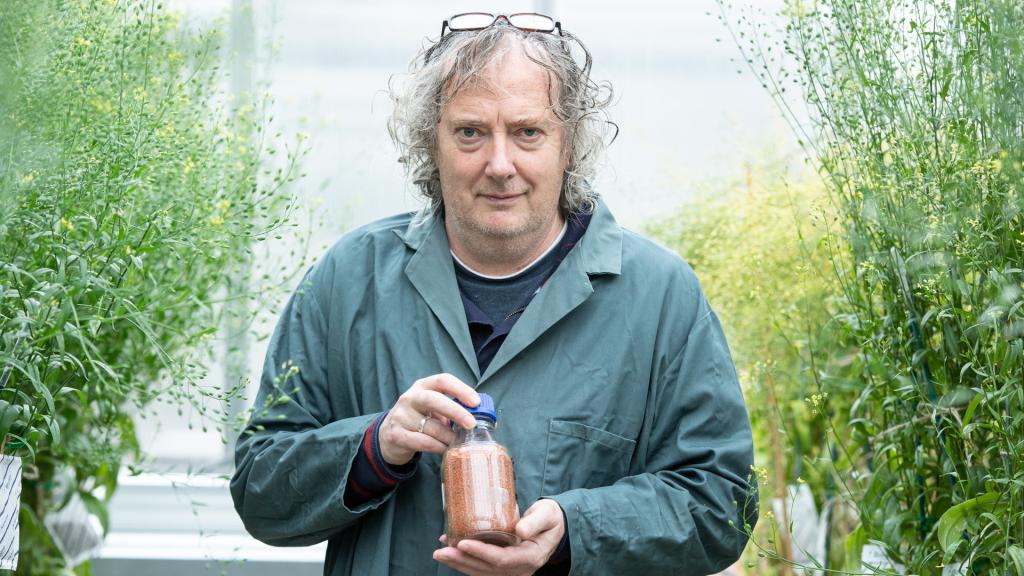United Kingdom
14 June 2024

Rothamsted has granted Yield10 Bioscience, Inc., based in Massachusetts USA, an exclusive global, commercial license to advanced technology for producing sustainable omega-3 products in Camelina sativa (“Camelina”). The culmination of over 20 years of research, the engineered Camelina plants have the potential to commercially produce omega-3 oil on land at scale for the first time. Such oils are widely used in the aquafeed, petfood, and nutritional supplement markets.
The licensing is the final step in a long journey by scientists at Rothamsted, led by Professor Johnathan Napier, to find a land-based and more sustainable source of heart-healthy omega 3 oils by inserting algal genes into the oilseed plant Camelina. Producing omega-3 fatty acids in this way will help meet growing global demand for eicosapentaenoic acid (“EPA”) and docosahexaenoic acid (“DHA”). Currently, the primary source of EPA and DHA is ocean-caught fish, where omega-3 oil produced from the annual Peruvian anchovy harvest is the industry benchmark. Over the last few years, there has been increasing pressure on the supply of omega-3 oil due to increased demand and environmental pressures on oceanic stocks. Producing omega-3 fatty acids in Camelina may represent a way to enable a predictable and sustainable supply of high-quality omega-3 oils to meet the growing global demand for EPA and DHA, by making fish oils in plants.
The licensing represents a significant achievement for UK bioscience expertise. Whilst British research in metabolic engineering has long been world-leading, very few UK bio-engineered crops have so far made the final leap to commercial translation and exploitation.
This technology could have significant benefits, offering sustainable production of an oil essential for nutrition and wellness to consumers, as well as providing crop diversification to growers
“Over the last three years, the Yield10 team has provided us with expertise and support as our team has advanced the development of engineered Camelina from field testing to planting at multi-acre scale to produce omega-3 oil,” said Professor Angela Karp, Rothamsted director and chief executive officer. “Yield10’s innovations and capabilities in Camelina are impressive and successful commercialization of this technology could have significant benefits, offering sustainable production of an oil essential for nutrition and wellness to consumers, as well as providing crop diversification to growers. We look forward to the commercialization of omega-3 oils by Yield10 in the years ahead.”
“Enabled by the Rothamsted technology, we are on a promising path to commercializing elite omega-3 producing varieties of Camelina that combine good agronomics in the field while also producing high-value, high-purity omega-3 oils possessing very attractive economics,” said Oliver Peoples, Ph.D., President and Chief Executive Officer of Yield10 Bioscience. “In 2024, we are positioned to execute on the scale-up of omega-3 producing Camelina and to submit key regulatory filings with the goal of being ready for an initial commercial launch into the oil and meal markets. We also look forward to improving the current Camelina varieties over time particularly with the deployment of herbicide tolerance and other performance traits.”
 Professor Johnathan Napier with Camelina Plants in the glasshouses at Rothamsted
Professor Johnathan Napier with Camelina Plants in the glasshouses at Rothamsted
In late 2020, Yield10 began a collaboration with Rothamsted to support Rothamsted’s BBSRC funded programme to develop omega-3 oils in Camelina. Drawing on research started over two decades ago, Professor Napier’s team has demonstrated the production of omega-3 oils in Camelina seed and conducted evaluations of the oils in salmon feeding and human clinical studies to demonstrate lipid lowering effects.
“This is a major step towards realising our dream of delivering an engineered crop with both environmental and consumer benefits,” said Professor Napier. “Developing such new varieties takes many hours of painstaking lab work, field trials and analysis, but I have been fortunate to work with many talented and dedicated colleagues who have contributed to this exciting outcome.”